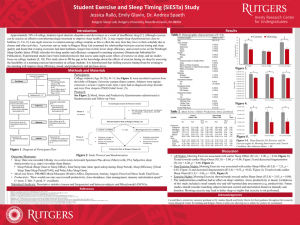Rallo, Jessica: Student Exercise and Sleep Timing (SiESTa) Study
Title: Student Exercise and Sleep Timing (SiESTa) Study
Name: Jessica Rallo
Major: Exercise Science
School affiliation: Honors College, School of Environmental and Biological Sciences
Programs: Aresty – Research or Conference Funding Recipient, Honors College Capstone
Other contributors: Andrea Spaeth and Emily Glavin
Abstract: College students are at an increased risk for insufficient sleep due to work obligations and social activities. Studies have shown a significant relationship between exercise and sleep; however, evening-exercisers exhibit poorer sleep compared to morning-exercisers. The purpose of the current study is to examine the effects of an exercise timing intervention on sleep, mood, stress, and productivity. Participants were recruited from campus recreation centers. Once enrolled, participants (N=11) wore wrist actigraphy devices to monitor sleep-wake, completed daily sleep diaries, and logged their workouts electronically. After a 2-week baseline period, participants were randomized into either the Control Condition (continue current exercise schedule) or Morning Exercise Condition (complete all workouts before noon) for two weeks. Measures of mood, stress, sleepiness and productivity were collected before and after the intervention. Multivariate ANOVA and mixed-model ANOVAs were conducted to determine differences between conditions in sleep, mood, stress and productivity. Participants in the Morning Exercise Condition woke up earlier (p = 0.03) and experienced less sleep fragmentation (p = 0.02) on non-exercise nights than Control Condition participants. No other sleep, stress, mood or productivity variables differed by condition. Data collection for this study remains ongoing as this preliminary data suggests that morning exercise may be beneficial improving sleep health.
